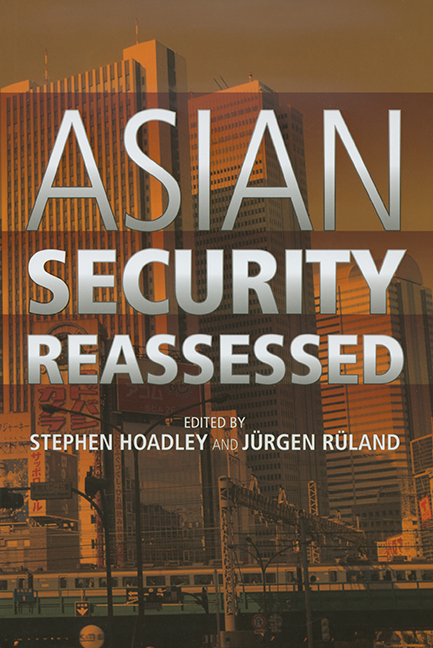Book contents
- Frontmatter
- Contents
- Acknowledgements
- About the Contributors
- List of Abbreviations
- Preface
- Part One Approaches to Asian Security
- Part Two Security Management by Asian States and Regional Institutions
- Part Three Non-Traditional Challenges to Asian Security
- Part Four New Concepts of Asian Security
- 13 Asian Security as a Global Public Good
- 14 Communities and Security in Pacific Asia
- 15 Traditionalism and Change in the Asian Security Discourse
- Index
15 - Traditionalism and Change in the Asian Security Discourse
from Part Four - New Concepts of Asian Security
Published online by Cambridge University Press: 21 October 2015
- Frontmatter
- Contents
- Acknowledgements
- About the Contributors
- List of Abbreviations
- Preface
- Part One Approaches to Asian Security
- Part Two Security Management by Asian States and Regional Institutions
- Part Three Non-Traditional Challenges to Asian Security
- Part Four New Concepts of Asian Security
- 13 Asian Security as a Global Public Good
- 14 Communities and Security in Pacific Asia
- 15 Traditionalism and Change in the Asian Security Discourse
- Index
Summary
INTRODUCTION
The chapters of this book have shown that the Asian security discourse is in flux. The negative impact of the energy crisis and the positive encouragement of détentein the 1970s, have shifted security thinking from a focus on military power of states to a more comprehensive conception of security. As explained in Chapter 1, comprehensive security is a much broader security concept that seeks to cope also with non-military threats caused by energy shortages, trade and financial crises, and international institutional instability. After the end of the Cold War there was another conceptual shift, albeit within narrow limits, towards human security policies to take account of new challenges of arms proliferation, environmental degradation, intra-state and inter-ethnic violence and terrorism, irregular migration flows, and human rights violations. More recently organized crime, cyber crime, and epidemics such as AIDS, SARS and bird flu have entered the security agenda. Yet, Asian policymakers and analysts are still far from abandoning state-centric outlooks to see security in terms of community-building as envisioned by Dominique Schirmer (Chapter 13), or a global public good as called for by Hermann Schwengel (Chapter 14). Security cooperation has never transcended “soft institutionalism” and is mostly confined to institutional balancing. It ends where states fear the loss of national sovereignty. If the options of policymakers are defined by a continuum where power politics and military strength constitute one pole and supranational cooperation marks the opposite pole, Asian security is still found to be closer to the realist pole. Jürgen Haacke's discussion of regional security institutions (Chapter 6) and the other contributions to Part II of this book indirectly confirm this characterization.
This concluding chapter seeks to identify reasons why this is the case. What are the major ideational and material impediments to comprehensive and human security in Pacific Asia? The chapter begins with an analysis of the ideas and experiences that influence the security culture prevalent among Asian decision-makers and the broader public. I then take a closer look at the domestic preconditions for cooperative and human security, the institutional prerequisites and the actors involved in the security discourse. The next section discusses the costs related to institution-building in the security sector. The chapter ends with a discussion of the impact of systemic influences on security thinking in the region.
- Type
- Chapter
- Information
- Asian Security Reassessed , pp. 346 - 368Publisher: ISEAS–Yusof Ishak InstitutePrint publication year: 2006



